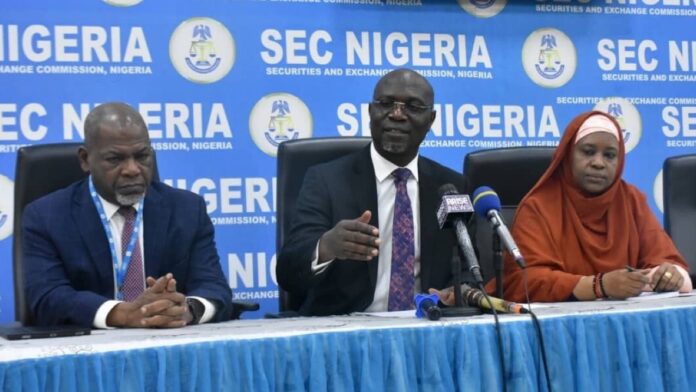Nigerian banks, through the recapitalisation exercise, have so far raised over ₦1.7 trillion from the capital market, this is as the Securities and Exchange Commission (SEC) revealed that the total fund raised by both the banks and other companies hit ₦2.7 trillion, according to BusinessDay.
Emomotimi Agama, the Director-General of SEC, disclosed this while giving a keynote address at the Commission’s 2024 Journalists Academy with the theme, ‘Fintech: Leveraging Technology to Drive Capital Market Participation.’
He said, “As you are aware, we came on board with an important banking recapitalisation exercise which we can declare has been successful. About ₦1.7 trillion has been raised so far from the market. This exercise will enhance financial stability and bolster investor confidence and improve the Nigerian economy.
“The Presidential Enabling Business Environment Council (PEBEC) set up a 90-day Regulatory Reform Accelerator Programme earlier in the year. The programme was meant to improve service delivery across MDAs and for us this speaks to attracting both foreign and domestic investors by improving disclosures and access to relevant information.”
According to the DG, there has been a significant shift in the nation’s macroeconomic indicators, adding that the Commission has continued to adopt programmes and strategies to reposition its operations.
Among these programmes adopted by the Commission are the creation of specialised departments to focus on some of the developments in the markets and ensure proper regulation, creation of a Fintech and Innovation Department and a Derivatives and Risk Management Department, creation of an office of Municipal Bond, Office of Business Advocacy and Capital Formation, as well as Office of Unclaimed Monies and Office of Power Supply.
The SEC DG highlighted the importance of these departments in regulating crypto-assets, derivatives, and forex CFDs, as well as tackling longstanding issues such as unclaimed dividends so as to address financial innovation, emerging risks and improve the service delivery of the Commission.
Agama, speaking further, hinted on the Commission’s ongoing effort, working with the Nigerian Financial Intelligence Unit (NFIU) to ensure Nigeria exits the FATF grey list adding that this is crucial for the development of the financial sector.
He said, “We have made significant progress in registering Capital Market Operators (CMOs), including on-boarding FinTechs under our Regulatory Incubation Programmes (RIP and ARIP). This effort ensures that our regulatory framework is inclusive and forward-looking.
“The SEC is also actively working with the Nigerian Financial Intelligence Unit (NFIU) to ensure Nigeria exits the FATF grey list. This is crucial for the development of the financial sector. This collaborative effort, when successful, will ensure the international financial credibility of the Nigerian financial system and avert economic sanctions.”
The DG also noted the commitment of the commission towards improving the operations of capital markets in Nigeria by updating the Investment Securities Act 2007, adding that there are ongoing plans to ensure full implementation of the Revised Capital Market Masterplan (2021-2025) by prioritising stakeholder engagement, awareness creation, capacity building, and developing regulatory frameworks that support innovative financial products.
According to him, the Commission gave approval of the Ministry of Finance Incorporated Real Estate Investment Fund (MREIF) to tackle housing deficit in Nigeria by enabling affordable mortgage financing, which aligns with the federal government’s One Million Homes Initiative.



